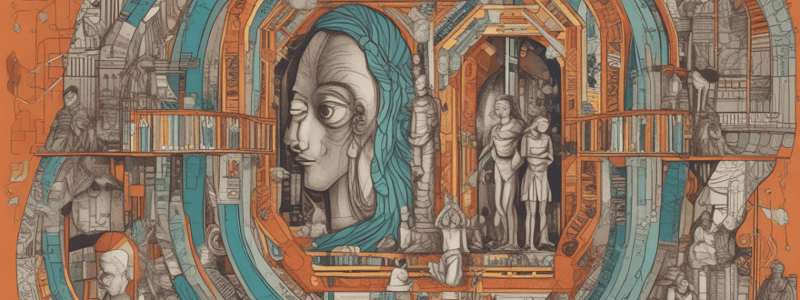Podcast
Questions and Answers
What is the relationship between formal and informal patterns in shaping societal modes of existence?
What is the relationship between formal and informal patterns in shaping societal modes of existence?
Formal and informal patterns are interrelated, with formal institutions influencing informal patterns, and informal patterns, in turn, influencing formal institutions.
What is the primary function of norms in society?
What is the primary function of norms in society?
Norms prescribe correct behavior and provide guidelines for social interaction, influencing individual behavior and perpetuating social structures.
How do values shape individual behavior in society?
How do values shape individual behavior in society?
Values, as personal principles or standards of behavior, influence individual judgment of what is important in life and inform behavior, often reflecting shared ideas of what is desirable or acceptable in a society.
What is the role of institutions in shaping societal modes of existence?
What is the role of institutions in shaping societal modes of existence?
Signup and view all the answers
How do culture and social structure impact individual behavior?
How do culture and social structure impact individual behavior?
Signup and view all the answers
What is the tension between determinism and free will in the context of societal modes of existence?
What is the tension between determinism and free will in the context of societal modes of existence?
Signup and view all the answers
What is the primary distinction between social status and social role in the context of societal modes of existence?
What is the primary distinction between social status and social role in the context of societal modes of existence?
Signup and view all the answers
How do social statuses influence an individual's behavior, according to normative regulation?
How do social statuses influence an individual's behavior, according to normative regulation?
Signup and view all the answers
What is the primary debate surrounding the relationship between society and the individual, in terms of agency and control?
What is the primary debate surrounding the relationship between society and the individual, in terms of agency and control?
Signup and view all the answers
How do social roles and performances contribute to the constitution of societies?
How do social roles and performances contribute to the constitution of societies?
Signup and view all the answers
How do societal modes of existence shape human behavior, and what are the implications for individual agency?
How do societal modes of existence shape human behavior, and what are the implications for individual agency?
Signup and view all the answers
What is the primary concern of the 'structure vs. culture' debate in understanding society?
What is the primary concern of the 'structure vs. culture' debate in understanding society?
Signup and view all the answers
What is the significance of culture in shaping social norms and values, and how do subcultures and countercultures emerge?
What is the significance of culture in shaping social norms and values, and how do subcultures and countercultures emerge?
Signup and view all the answers
What is the relationship between social status and access to power, according to the concept of status?
What is the relationship between social status and access to power, according to the concept of status?
Signup and view all the answers
In what ways do social structures, such as institutions and organizations, shape individual behavior and social outcomes?
In what ways do social structures, such as institutions and organizations, shape individual behavior and social outcomes?
Signup and view all the answers
How do social roles and performance influence individual behavior and social outcomes, and what are the implications for social change?
How do social roles and performance influence individual behavior and social outcomes, and what are the implications for social change?
Signup and view all the answers
What is the tension between determinism and free will in understanding human behavior, and how do social structures and culture influence this debate?
What is the tension between determinism and free will in understanding human behavior, and how do social structures and culture influence this debate?
Signup and view all the answers
How do social structures, such as patterns of organization, constrain human behavior in societies?
How do social structures, such as patterns of organization, constrain human behavior in societies?
Signup and view all the answers
What is the significance of the determinism vs. free will debate in understanding the social world, and how does it relate to social structures and culture?
What is the significance of the determinism vs. free will debate in understanding the social world, and how does it relate to social structures and culture?
Signup and view all the answers
How do cultural frameworks, including subcultures and countercultures, shape societal norms and values?
How do cultural frameworks, including subcultures and countercultures, shape societal norms and values?
Signup and view all the answers
Study Notes
Societal Modes of Existence
- Societies are constituted by institutions, norms, values, and culture.
- Institutions: sets of linked social practices (e.g., education, marriage, family) that are informed by broader culture, regularly repeated, and sanctioned by social norms.
- Norms: rules that prescribe correct behavior, informed by values, and often unofficial but commonly understood.
- Examples of norms: expected norms of behavior between mother and father, between professor and student.
- Values: personal principles or standards of behavior, shared ideas of what is good/bad, desirable/undesirable, or sacred/profane in a society.
- Values are often based on social group membership.
Culture and Social Structures
- Societies are always embedded in culture or cultural frameworks.
- Culture: the symbolic and learned aspects of human society, transmitted and shared via social interaction.
- Subculture: the symbols and lifestyles of a subgroup in society, deviating from the "normal" culture.
- Examples of subcultures: punk groups, hippies in the 1960s in the U.S.
- Counterculture: values and behaviors that go against those of mainstream society.
Social Structures
- Social structures: patterns of organization that constrain human behavior.
- Social structures are captured by the concepts of 'status' and 'role'.
- Individuals acquire social status: a position in social relations (e.g., mother, father, teacher, president) – ascribed or achieved.
- Status is normatively regulated, and individuals are expected to behave in particular ways.
- Status can also refer to a particular rank that leads to access (or a lack of access) to power.
Roles and Status
- In positions of status, individuals assume social roles: bundles of socially defined attributes, expectations, and behaviors associated with social statuses or positions.
- Statuses are "occupied", roles are "played".
- Examples of status and roles: mother, father, teacher, president.
Understanding the Social World
- Two approaches to understanding the social world:
- How society affects the individual (society's effects)
- What is society made of and what affects society
- Determinism vs. free will: the debate about the extent to which society influences individual behavior.
- Structure vs. culture: the debate about the importance of social structures and cultural frameworks in shaping society.
Societal Modes of Existence
- Societies are constituted by institutions, norms, values, and culture.
- Institutions: sets of linked social practices (e.g., education, marriage, family) that are informed by broader culture, regularly repeated, and sanctioned by social norms.
- Norms: rules that prescribe correct behavior, informed by values, and often unofficial but commonly understood.
- Examples of norms: expected norms of behavior between mother and father, between professor and student.
- Values: personal principles or standards of behavior, shared ideas of what is good/bad, desirable/undesirable, or sacred/profane in a society.
- Values are often based on social group membership.
Culture and Social Structures
- Societies are always embedded in culture or cultural frameworks.
- Culture: the symbolic and learned aspects of human society, transmitted and shared via social interaction.
- Subculture: the symbols and lifestyles of a subgroup in society, deviating from the "normal" culture.
- Examples of subcultures: punk groups, hippies in the 1960s in the U.S.
- Counterculture: values and behaviors that go against those of mainstream society.
Social Structures
- Social structures: patterns of organization that constrain human behavior.
- Social structures are captured by the concepts of 'status' and 'role'.
- Individuals acquire social status: a position in social relations (e.g., mother, father, teacher, president) – ascribed or achieved.
- Status is normatively regulated, and individuals are expected to behave in particular ways.
- Status can also refer to a particular rank that leads to access (or a lack of access) to power.
Roles and Status
- In positions of status, individuals assume social roles: bundles of socially defined attributes, expectations, and behaviors associated with social statuses or positions.
- Statuses are "occupied", roles are "played".
- Examples of status and roles: mother, father, teacher, president.
Understanding the Social World
- Two approaches to understanding the social world:
- How society affects the individual (society's effects)
- What is society made of and what affects society
- Determinism vs. free will: the debate about the extent to which society influences individual behavior.
- Structure vs. culture: the debate about the importance of social structures and cultural frameworks in shaping society.
Studying That Suits You
Use AI to generate personalized quizzes and flashcards to suit your learning preferences.
Related Documents
Description
This quiz explores the constitution of societies, including formal and informal patterns, institutions, and social practices informed by broader culture.




